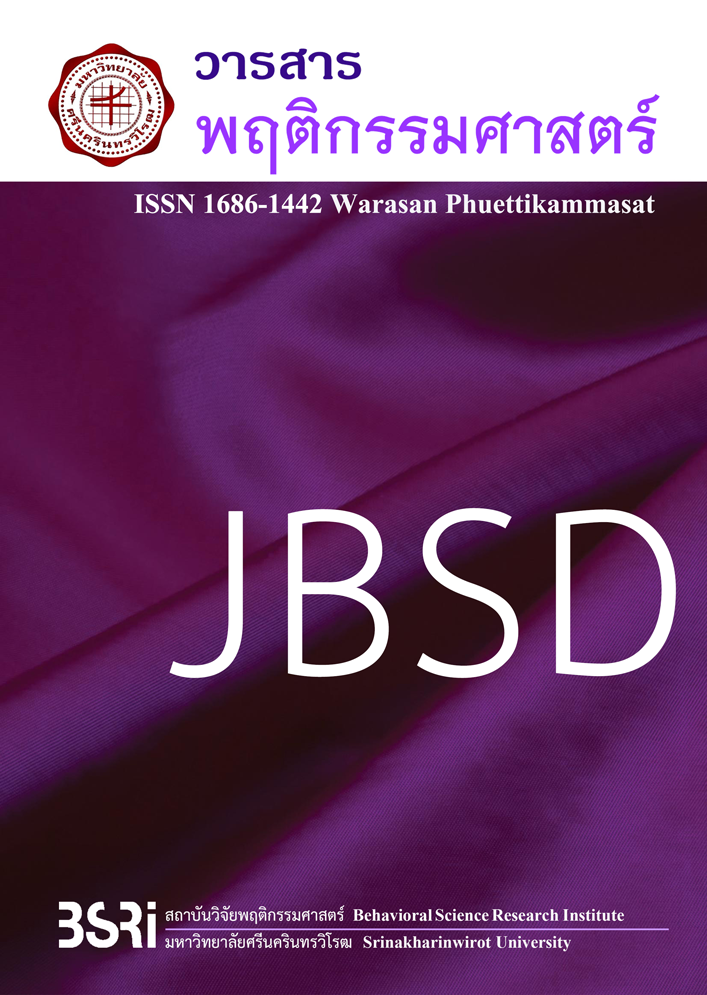การทำนายพฤติกรรมการป้องกันโรคอ้วน: ประสิทธิภาพของทฤษฎีพฤติกรรมตามแผนและตัวแปรส่วนขยาย
Abstract
Predicting obesity prevention behavior: efficacy of the extended theory
of planned behavior
The purposes of study were to 1) examine the consistency of the proposed causal relationship model of obesity prevention behavior, including physical activity and eating behavior models, with empirical data and 2) to identify direct and indirect effects of factors predicting those two behaviors based on the theory of planned behavior (TPB) and past behavior. The sample was 418 bachelor degree students in semester 2, academic year 2015, Srinakharinwirot University. Self-administered questionnaires based on the TPB were used for data collection, including the TPB questionnaires for eating behavior and physical activity. The proposed models were tested and modified by path analyses. The final models adequately fit to the empirical data. Regarding causal relationship model of eating behavior, intention and past eating behavior had positive direct effects on the eating behavior (β = 0.27 and 0.55, respectively), which past eating behavior was the strongest predictor. Behavioral beliefs, normative beliefs, control beliefs, attitudes, subjective norm and perceived behavioral control, had significant effects on intention and eating behavior. Past eating behavior also had direct effects on attitudes and perceived behavioral control. All predictors in the causal relationship model accounted for 45% of variance in eating behavior. With regards to physical activity, intention and past physical activity had positive direct effects on physical activity (β = 0.17 and 0.46, respectively), which past physical activity was the best predictor. Normative beliefs, control beliefs, subjective norm and perceived behavioral control had significant effects on intention and physical activity. Behavioral beliefs and attitudes had significant effects on intention, but not physical activity. All variables in the model explained 25% of variance in physical activity.
Keywords: theory of planned behavior, eating behavior, physical activity, past behavior
บทคัดย่อ
การศึกษานี้มีวัตถุประสงค์เพื่อ 1) ตรวจสอบความกลมกลืนของโมเดลความสัมพันธ์เชิงสาเหตุของพฤติกรรม
การป้องกันโรคอ้วนซึ่งแยกเป็น 2 พฤติกรรม คือ พฤติกรรมการบริโภคอาหารและพฤติกรรมการเคลื่อนไหวออกกำลังกับข้อมูลเชิงประจักษ์ และ 2) ศึกษาอิทธิพลทางตรงและทางอ้อมของปัจจัยเชิงสาเหตุตามทฤษฎีพฤติกรรมแผนร่วมกับพฤติกรรมในอดีตที่มีต่อพฤติกรรมการบริโภคอาหารและพฤติกรรมการเคลื่อนไหวออกกำลัง กลุ่มตัวอย่างเป็นนิสิตระดับปริญญาตรี มหาวิทยาลัยศรีนครินทรวิโรฒ จำนวน 418 คน เครื่องมือที่ใช้ในการเก็บข้อมูล ได้แก่ แบบวัดพฤติกรรมการบริโภคอาหารและพฤติกรรมการเคลื่อนไหวออกกำลัง และแบบวัดตัวแปรในทฤษฎีพฤติกรรมตามแผน ผลการศึกษา พบว่า โมเดลโครงสร้างเชิงสาเหตุที่ผู้วิจัยสร้างขึ้นภายหลังการปรับมีความสอดคล้องกับข้อมูล
เชิงประจักษ์ ในโมเดลโครงสร้างเชิงสาเหตุของพฤติกรรมการบริโภคอาหาร พบว่า เจตนาในการกระทำพฤติกรรม
การบริโภคอาหารและพฤติกรรมการบริโภคอาหารในอดีตมีอิทธิพลทางตรงต่อพฤติกรรมการบริโภคอาหาร เจตคติต่อพฤติกรรมการบริโภคอาหาร การคล้อยตามกลุ่มอ้างอิงในการกระทำพฤติกรรมการบริโภคอาหาร และการรับรู้
การควบคุมพฤติกรรมการบริโภคอาหารทั้งทางตรงและทางอ้อม มีอิทธิพลต่อเจตนาในการกระทำพฤติกรรม
การบริโภคอาหารและพฤติกรรมการบริโภคอาหาร พฤติกรรมการบริโภคอาหารในอดีตยังมีอิทธิพลทางตรงต่อ
การรับรู้การควบคุมพฤติกรรมการบริโภคอาหารทางตรงและเจตคติต่อพฤติกรรมการบริโภคอาหารทางตรง
ส่วนโมเดลโครงสร้างเชิงสาเหตุของพฤติกรรมการเคลื่อนไหวออกกำลังพบว่า เจตนาในการกระทำพฤติกรรม
การเคลื่อนไหวออกกำลัง และพฤติกรรมการเคลื่อนไหวออกกำลังในอดีต มีอิทธิพลทางตรงต่อพฤติกรรม
การเคลื่อนไหวออกกำลัง การคล้อยตามกลุ่มอ้างอิงในการกระทำพฤติกรรมการเคลื่อนไหวออกกำลังทั้งทางตรงและทางอ้อม การรับรู้การควบคุมพฤติกรรมการเคลื่อนไหวออกกำลังทั้งทางตรงและทางอ้อม มีอิทธิพลต่อเจตนาใน
การกระทำพฤติกรรมการเคลื่อนไหวออกกำลังและพฤติกรรมการเคลื่อนไหวออกกำลัง ส่วนเจตคติต่อพฤติกรรม
การบริโภคอาหารทั้งทางตรงและทางอ้อม มีอิทธิพลต่อเจตนาในการกระทำพฤติกรรมการเคลื่อนไหวออกกำลัง
แต่ไม่มีอิทธิพลต่อพฤติกรรมการเคลื่อนไหวออกกำลัง
คำสำคัญ: ทฤษฎีพฤติกรรมตามแผน พฤติกรรมการบริโภคอาหาร พฤติกรรมการเคลื่อนไหวออกกำลัง พฤติกรรมในอดีต
Downloads
Downloads
Published
How to Cite
Issue
Section
License
Behavioral Science Research Institute, SWU
114 Sukhumvit 23, Bangkok 10110, Thailand.
Tel.02-649-5000 # 17600



